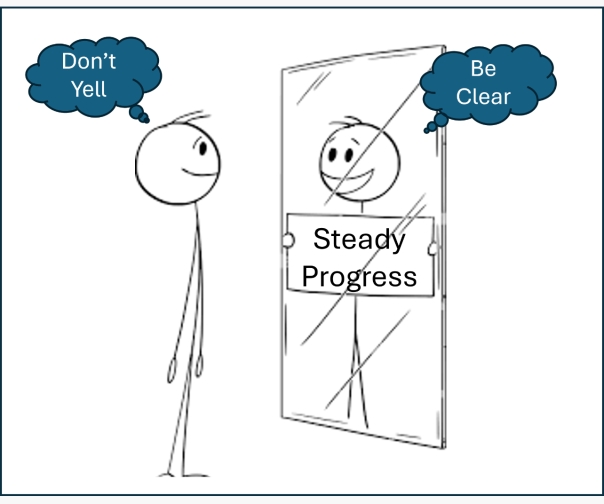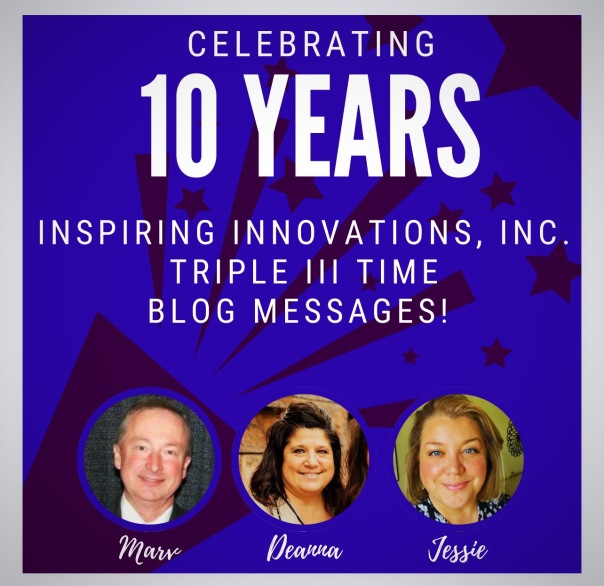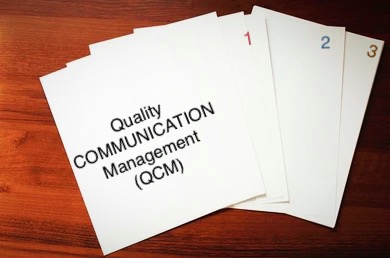Category Archives: Triple III
TRIPLE III TIME: Constructive Criticism
This week’s TRIPLE III TIME message beings by asking everyone to take a serious look in the mirror and assess your style of delivering Constructive Criticism! Think about it?! We have all been in THE situation that requires you to offer a personal statement of honesty regarding an action taken by a co-worker, friend, manager, colleague and/or even a family member. So how did you do?
Well before we go much further into our discussion… let’s see what GOOGLE says about the definition(s) of this challenging topic!
“Constructive Criticism is a form of feedback that focuses on delivering critique and negative feedback constructively and positively to improve performance or behavior. Constructive criticism is actionable, clear, and beneficial to the recipient.”
Or
“Constructive Criticism is a comment or comments saying in a helpful way what is wrong with something and how it could be improved.”
As you continue engaging with your image in the mirror… think if you try to always deliver your Constructive Criticism in a positive tone. Do your words of advice come across as critical and non-progressive? Or does your feedback generate the wish for additional assessment discussion that is issue specific… with improvements that are understandable and corrective action suggestions that are workable?
Bottomline: I believe the responsibility for providing Constructive Criticism today has become more challenging than in the past. Choosing the right words… controlling the tone of your message delivery… and offering the most appropriate alternative actions to be taken… is and always will be going forward… a HUGE professional responsibility.
So think more deeply about the words you use to create every Constructive Criticism message. Also remember that raising your voice may cause someone to listen less… so a soft, direct tone may be best. And finally only suggest an initial limited number of action improvements. Too many can be as damaging as too few.
If you are questioning if this message makes positive sense… put yourself on the Constructive CriticismRECEIVER side of the table.

Public Sector Entrepreneurship Part III

It has been quite some time since I have authored an American Society for Public Administration (ASPA) article on one of my favorite topic areas: Public Sector Entrepreneurship! Part III of this continuous series again is intended to offer a few innovative options for incorporating entrepreneurship thought/practices into the public sector worlds-of-work.
Public Sector Entrepreneurship: PART III – PA TIMES Online | PA TIMES Online
TRIPLE III TIME: Service Leadership

This week was one of those weeks that required me to “shift-gears” multiple times to match the “client-customer” needs that I was responsible for. And as I shared some of my thoughts and frustrations with a close colleague…I remembered a very special purposed leadership quote:
“Service leadership means more than just meeting the current needs of your client competently and efficiently. It also means stepping beyond the traditional client/provider boundaries to inspire change and fulfill the promise and the potential for the client.
Service leadership also means more than knowing your client. It requires the mastery of topics, issues, and insights related to your client’s experiences, goals, thinking, motivations and needs. A service leader creates a vivid picture of what will make the client prosper not only today but tomorrow. With that picture firmly in mind, the service leader then commits himself or herself to making it happen.”
(Henry Givray: Profile in Leadership)
As you can assume this quote and TRIPLE III TIME message are mostly directed to those involved in public sector/service jobs. In my career, I have logged over 40 years to the “CAUSE” of Service Leadership. And whether the client-customer was one person needing help and guidance with their life circumstances or an agency group who were in constant pursuit of that “ALWAYS A BETTER WAY!” opportunity, the principles in Mr. Givray’squote have held an important place in my daily actions.
It is critical with every passing day, that those in Service Leadership positions practice what they preach. Unfortunately there seems to be an ever-growing number of inappropriate leaders in important service positions. The result is the sharing of mis-information, conflict in workplaces, promises made but not kept and/or a lowering standard for doing your best and commitment to quality.
Bottomline: Do NOT take your Service Leadershipcapacities/responsibilities lightly. Client-customers still view you as LEADERS everyday…EVERYDAY! Reread Henry Givray’s quote one more time…it’s worth the reminder.
TRIPLE III TIME: Product/Services “Knowledge Classes”

Quality customer service has all kinds of measurements. You know what I mean. Friendly appearances inside the company/agency facility, professional/appropriate staff dress, informative communication processes, timely responses to customer questions on available products or services…and we can all think of several more to add to this list. But how often do we think about and test ourselves on conveying: (1) accurate, (2) complete, (3) up-to-date application process specifics, (4) location and consistent product/services knowledge??
Have you ever considered using periodic: Product/Services “Knowledge Classes” as a methodology of continuous improvement for all company/agency personnel?
In this day and age when products and services are continuously modified…access to them become available in a store or online, and the people working with/for us change more than in recent years; it is important to conduct fun, simple but vital Product/Services “Knowledge Classes” for EVERYONE!
Some of the questions that could be addressed in the classes may include but not be limited to the following:
- Do the new and senior staff share common product/services information with people?
- Are all customers given ALL the relative company/agency contact information?
- Is there a standard product /services “elevator sales pitch” that is used?
- Do some employees assume people “understand” product/services application and time specific information…and then take them for granted?
- Will potential customers walk away with the right product/services information that will enable them to positively pass it on?
I realize conducting periodic Product/Services “Knowledge Classes” sounds corny and maybe even insulting to some. However, before you cancel this TRIPLE III TIME message idea…give it a try.
TRIPLE III TIME: Pay Attention To The “Little Things”!
Guess what? This final 2023 TRIPLE III TIME blog message represents 10 years…yes a decade of sharing leadership, communication, professional development, innovation and sometimes personal special topic discussions. Since January of 2014, every Friday Jessie, Deanna and I work together to make sure each weekly (hopefully) inspirational posting is placed online for all to see.
Has it been challenging…YES. Has it been fun…YES. Do I feel it’s time to quit?…NO!
So as we conclude 2023…and together comprehend this large number of TRIPLE III TIME messages (520 to be exact)…I want to encourage everyone to: Pay Attention To The “Little Things” by way of a unique TIMELESS TWELVE. Specifically, I want you to think about when “Little Things” become BIG! Here are the TIMELESS TWELVE examples:
- When you realize that someone or a group has replicated a special idea/activity that you created.
- When an old picture has new meaning…just when it was almost thrown away.
- When you realize having people tell their career story is needed from all age groups…to all age groups.
- When a void is felt when you did not return a call…and the person is no longer around.
- When you realize pure creativity and innovation ispossible for everyone…anytime.
- When you reach back to a colleague from 30 years ago…ask for help…and they just ask when and where.
- When playing with crayons or simple building blocks with a child becomes cool…again.
- When an individual fondly remembers and reports the special help you gave them many years ago.
- When you experience teamwork as a favorite organizational past-time.
- When you get to spend extra quality time with an aging parent…who understands their limitations.
- When everyone views “retirement” as just an alternate/NEW way for a person to contribute.
- When people proudly and regularly seek your counsel, advice and suggestions as a friend, co-worker and/or professional.
I hope everyone gives each of these TIMELESS TWELVE… Pay Attention To The “Little Things” examples some individual focus. So much to gain!
We will start 2024 next week.

TRIPLE III TIME: Be the GROWTH Example

“Bravery is not something we’re born with, but something we grow into and learn as we progress through life. However it is much harder to be brave if we believe that the person we are now is the same person we will always be. A GROWTH mind-set is the thing that allows us to be brave in the face of adversity. It’s our brains way of encouraging us to love a challenge-here’s a chance to learn!” (GREAT TED TALKS-Leadership by Harriet Minter)
This thoughtful paragraph written by Ms. Minter says an awful lot…in just a few sentences. Do you see/read what I mean?
In the first sentence Harriet tried to make the point that one must be patient and not to expect to be immediately “all-knowing” no matter your age. GROWTH comes to us as we move through our daily lives…so maybe we need to slow down and become a little more aware of all the diverse learning activities going on around us and maximize their progressive potential!
Next, she recommended that we not be afraid of GROWTH through adversity. Rather Ms. Minter indicates that approaching adversity through bravery is just natures way of challenging us and opening up new opportunities for us to learn.
(Now go back and read her quote again. What is YOUR take-away from these words?)
My biggest TRIPLE III TIME take-away from this great TED TALKS excerpt…is that it is forever critical to Be The GROWTH Example! Too often people shy away from life’s challenges and very much lose the personal and professional GROWTH elements contained in every one. Her paragraph also gives us a different “OPPORTUNITY OF A LIFETIME” scenario…and suggests that if you don’t approach life’s challenges with bravery…you may never get that OPPORTUNITY again.
TRIPLE III TIME: Quality COMMUNICATION Management (QCM)
People in all areas of their lives often are concerned about how well they communicate. Whether it is with family members, co-workers, students, friends or colleagues in their career field… Quality COMMUNICATION Management (QCM) is a critical, priority concern.
Today more than ever before, I believe the greatest challenge in the area of high quality communication is the diversity of communication options. Think about it. Tweets, emails, phone calls, letters, texts, podcasts, FaceTime, in-person meetings and other social media-isms…make the objective of delivering a complete and informative message understandably difficult.
So what’s the III self-help answer: Complete a Quality COMMUNICATION Management (QCM)assessment/evaluation! What do I mean?
My “official” QCM Assessment/Evaluation calls for a periodic “Test of 3” in specific communication areas. For example:
- Take 3 email examples and determine if they are complete messages or just “blips” of what you want to say.
- Take 3 cell phone messages and determine if the discussion assumes the call receiver knows everything you expect they do.
- Take 3 formal letters you have written/sent and assess them for purpose, content, receiver expectations and timeliness.
- Take 3 meeting agendas that you have utilized in recent in-person meetings and evaluate them for main topic(s), use of personnel time and outcomes.
- Take 3 virtual training session recordings and measure your learning points, questions asked and knowledge obtained.
Conducting multi-media Quality COMMUNICATION Management (QCM) assessments/evaluations is very…VERY IMPORTANT in today’s world. Use the five questions in this TRIPLE III TIME message as starter points…then create your own measuring sticks. And go ahead be critical…it will only make you better!

TRIPLE III TIME: Know Your Role
Throughout my career, I have had the opportunity to work in a variety of roles within my worlds of work! For example, I have worked as a:
- Youth Advisor
- Asphalt Truck Driver
- Farmhand
- Bowling Machine Repairman
- Insurance Inspector
- Sports Store Salesperson
- Program Planner
- Director
- Consultant
- Adjunct Faculty
- Adult Program Placement Worker
- Board Member
In almost every situation a job description was available to help one: “Know Your Role?” However in most workplaces, I will admit that I was able to quietly model my role somewhat in a way that not only benefitted the employer…but also allowed me to customize my job role and thereby heighten my product/services contributions. And although there are other concepts I would like to cover and explain their positive learning lesson values…but not this week.
For this week’s TRIPLE III TIME message I want to share my “Know Your Role?” thoughts that come from both my employee and employer experiences. Here are my Serious 6!
First, DON’T assume or attempt to read your supervisor’s mind about your role. You will be incorrect most of the time…so just ask! Second, know your limitations. Don’t make performance role promises you can’t keep. Starting a lot of projects is cool…but not finishing them is a problem. Third, be a continuous “job student”. The more you know about what you are doing…the better you will do it. Fourth, go ahead and “over-do” role tasks for qualities sake. If it means more money sometimes…AOK…but don’t excel only for the money. Fifth, don’t change how things are done just because they are not done how you think they should be. Listen more and create a “I can show you” role situation. Finally, learn to remember those things that could be done better…especially in the treatment of workers role. Why…so when YOU become boss and “Know Your Role?”…YOU will do things better.

TRIPLE III TIME: “Practicing What YOU Preach!”
First let me admit that taking on this topic message: “Practicing What YOU Preach!” has been avoided for quite some time. Why? Maybe because I am not the best…most complete listener that I preach everyone should be?! Or maybe I take calculated risks more often and maybe more risky risks than I would admit to in some of my weekly TRIPLE III TIME blog messages. However, no matter my position, the professional value in this life-long statement of wisdom is regularly accepted across everyone’s workplace and life situations.
Therefore, in order to give “Practicing What YOU Preach!” its full TRIPLE III TIME notoriety, here is a customized TOP 10 that I am sure will hit-home with many:
1. Are you giving someone else’s good idea a real, solid chance?
2. Are you revising your stance that just because your best way worked 15 years ago…it may not be the best way today?
3. Are you giving employees, partners, customers, co-workers, family…a second or third chance?
4. Are you not being immediately defensive when questioned about an action you took?
5. Are you accepting change as standard-business activity?
6. Are you not preparing an answer in your mind…before you hear the whole story?
7. Are you really getting things done ahead of schedule…or are old reminders still necessary?
8. Are you still ignoring quality research and data that says your cool idea isn’t cool?
9. Are you limiting your techno-time or are you now addicted to social media?
10. Oh yeah…are you listening better and more completely everyday…EVERYDAY?
I am sure you are looking in the mirror when you ask yourself the question are you “Practicing What YOU Preach?” about these or other questions. Who knows…honesty may show up.
Have fun with this TRIPLE III TIME exercise!

TRIPLE III TIME – This Semester’s Priority: COMMUNICATION
This week is Spring semester class start-up at our community college. Remember, I teach two classes each semester and my single specific instruction area is American Government & Politics. As you can guess this is a fun, great, diverse course and between the two classes I have about 30 students in total.
One of my traditions every semester is to identify an individual professional development priority for everyone to improve on as a person and as a student. This Semester’s Priority: Communication was received with a good number of why…what…when…where…and how questions. Their concerns were not a surprise but my answer seemed to add up to a very important TRIPLE III TIME message.
Here are some summary bullet points of what I told them:
- Communication…good communication skills are the most important transferable skills…for EVERYTHING!
- Communication…good communication skills can open many opportunity doors…bad communication skills will close them.
- Communication…good communication in whatever form will cause you to be invited back for many progress opportunities.
- Communication…good communication defeats gossip.
- Communication…good communication can help you make a positive difference for yourself and others.
Well I could tell that my good communication discussions were reaching the “this is too much” for the first class level. However, for this TRIPLE III TIME message remember: (1) Communication has to happen so make it good, (2) Be aware of your own Communication strengths and weaknesses, (3) Make quality Communication part of your organizations culture, and (4) Help everyone understand THEY own their Communication…so THEY should make it the best everyday…EVERYDAY!
